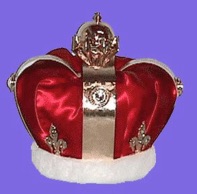Study to shew thyself approved unto God, a workman that needeth not to be ashamed, rightly dividing the word of truth. 2 Tim. 2:15

King James AV1611
The Kings of Israel
The Kings of Israel was taught by Dr. James Modlish
Lesson Six
The Davidic Covenant
(2 Sam. 7)
Introduction:
Two phrases in this chapter summarize the main lesson: “thy throne … and thy seed” (vs. 12,16). This Davidic Covenant (also given in I Chron. 17) is important to the program of God, because in it God promises certain blessings to the Jewish nation. In His covenant with Abraham (Gen. 15), God had promised a seed, a land, and a blessing to all nations. The blessings find their fulfillment in the Davidic Covenant where God reveals that the promised Messiah would come through David’s line (Rom. 1:3,4).
I. A noble purpose - vs. 1-3
David had a love for the house of God (Ps. 132), and his desire was to build a beautiful house for the ark. God would not permit this
(I Chron. 22:8), but He would acknowledge David’s love inasmuch as this desire was in his heart. (I Kings 8:18)
II. A wonderful promise – vs. 8-17
God gave Nathan a special message for David in the night. (Ps. 17:3)
God’s grace – vs. 5-10
God had never asked for an elaborate building but “humbled himself” (Phil. 2:7,8) and dwelt in a tent. The picture is clear – Jesus Christ humbled Himself and came to earth to occupy an earthly tabernacle. (John 1:14) Another demonstration of God’s grace was His treatment of David. (vs.8) This is representative of how God will treat all His children.
God’s purpose – vs. 11-16
The word “house” has a double meaning in this passage: (1) a material house, the temple (vs. 13); and (2) a human house, David’s family. (vs. 11,16,19,25, 27,29). It is customary to speak of a royal family as “a house” such as the “House of Windsor” in Great Britain.
God states that the throne would be forever. (vs. 13) We all realize that David does not have a descendant upon the throne today.
Ps. 89:33-37 reminds us that God would never break His covenant with David, even though He might have to chasten David’s children.
The ultimate fulfillment of these promises is in Jesus Christ. (Lk. 1:28-33) That kingdom in which Christ will reign is on hold until God is presently finished with calling out a Gentile people for His name. (Acts 15:13-18)
III. A humble prayer – vs. 18-29
David received the message from Nathan, then went in to pray, asking God to fulfill His word. (vs. 28,29) How much more we would receive from messages if we spent some time with God afterward and “prayed the message in!” David had asked permission to build an earthly temple; God responded by promising him an eternal kingdom! This tremendous act of grace left David humbled before the Lord, and in his prayer the king praises the greatness of the Lord. He realizes the privileged position of Israel. (vs. 22-24)
The moral of the story is Romans 4:21!
-Page Navigation-
Lessons: 1 | 2 | 3 | 4 | 5 | 6 | 7 | 8 | 9 | 10 | 11 | 12 | 13 | 14 | 15 | 16 | 17 | 18 | 19 | 20 | 21

